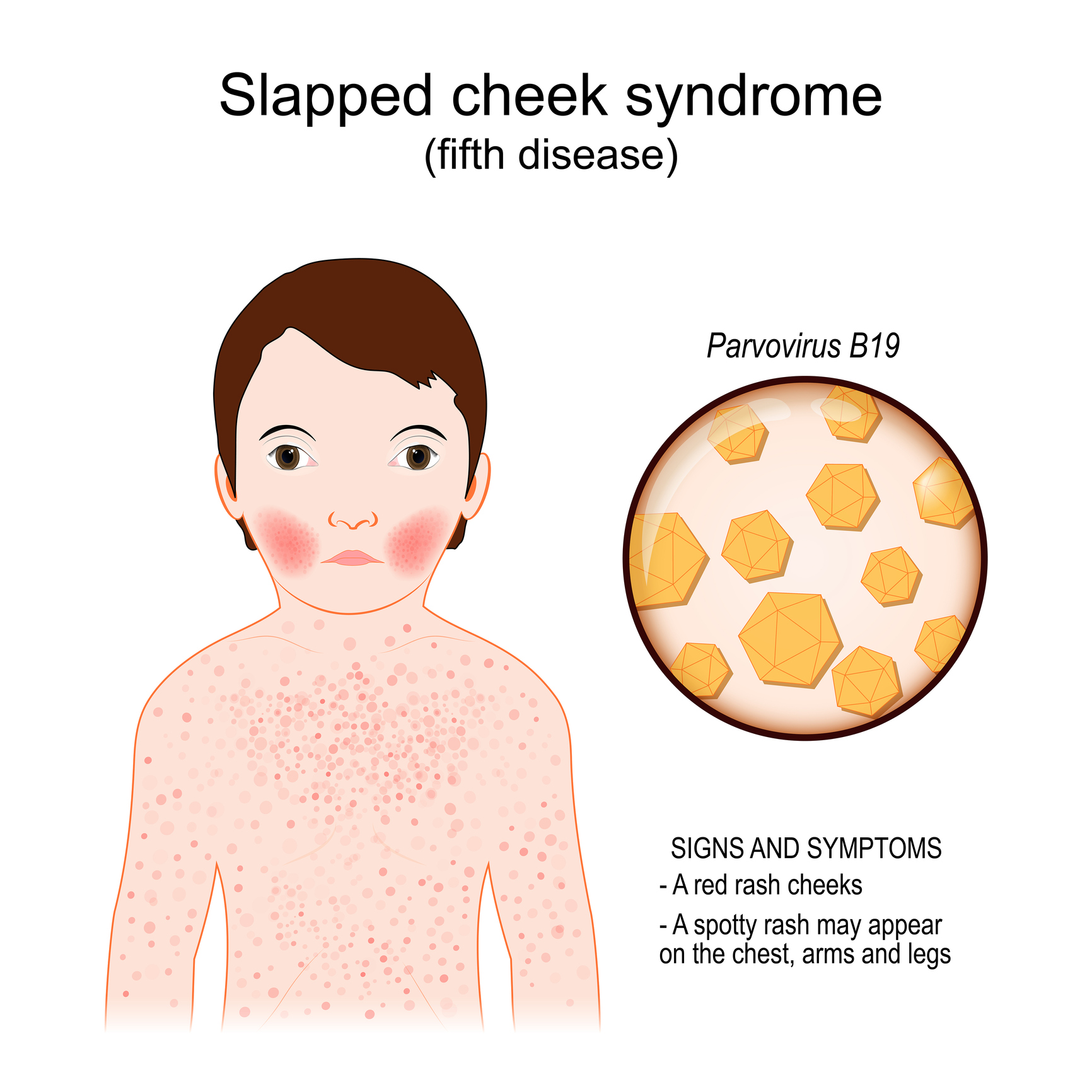What GPs want you to know about slapped cheek syndrome and the extra precautions to take in pregnancy
Slapped cheek syndrome is a common and usually very mild illness in children, but you should be aware of the risks if you are pregnant

Slapped cheek syndrome, or ‘fifth disease’, is a relatively minor condition that sounds much worse than it actually is. However, although in children this common virus is considered mild and they are expected to make a complete recovery, GPs warn that there are extra precautions you need to take if you’re pregnant.
The National Institute for Health and Care Excellence (NICE) describes slapped cheek syndrome as a viral infection caused by parvovirus B19. It is sometimes also informally called 'cheek slap rash' or 'face slap disease' and can be referred to as the 'fifth disease' because historically it was classified as the fifth of the classic childhood skin rashes, after measles, scarlet fever, rubella and Dukes' disease.
It is usually defined by a red rash on children’s cheeks, which is where the virus gets its name. Slapped cheek can be difficult to spot, or is easily confused with other illnesses, as other symptoms of the virus are similar to coughs and colds in babies and children, such as a high temperature, runny nose, and sore throat.
We spoke to three GPs; Dr Stuart Sanders, GP at The London General Practice, NHS GP Dr Thuva Amuthan and GP Dr Chun Tang, for advice on what to do if your child contracts slapped cheek, and they answered your most common questions as well as sharing important advice on extra precautions to take if you are pregnant.
The information in this article is for general purposes only and does not take the place of medical advice. It is essential to be guided by your GP and take note of official NHS advice. You should immediately seek medical attention if symptoms worsen or you are concerned about your child. If you are unsure, concerned about their symptoms or a rash that has appeared, then it is crucial to seek personalised advice from a doctor as soon as possible.
What is slapped cheek syndrome?
"Slapped cheek syndrome is a minor children's infection in which they start with a temperature, followed by a snuffy running nose," GP Dr Stuart Sanders explained to GoodToKnow. "One or two days later they have red cheeks, right and left, which has the appearance of having been slapped. The rash on the face can be followed by a generalised blotchy skin eruption. It is usually a very mild disease."
On the symptoms that you can expect your child to experience if they contract slapped cheek syndrome, NHS GP Dr Thuva Amuthan explains that they, "may feel unwell for the first few days with a temperature, runny nose, sore throat and headache."
Parenting advice, hot topics, best buys and family finance tips delivered straight to your inbox.
According to Pall Mall Medical cases of slapped cheek syndrome are most common in children between the ages of four and 12. However, babies and adults can also get slapped cheek syndrome and although harmless for most, it can be serious if you are pregnant.
The NHS advises that you should see a GP if you think you have slapped cheek syndrome and you are pregnant, have a blood disorder or have a weakened immune system. Seek urgent medical treatment if you think you or your child has slapped cheek syndrome and also has very pale skin, shortness of breath, extreme tiredness or has fainted.

The slapped cheek rash
The rash caused by slapped cheek syndrome is usually the symptom that most parents will notice first. In general, a slapped cheek rash is not painful.
The NHS says, “It's hard to avoid spreading slapped cheek syndrome because most people do not know they have it until they get the rash. You can only spread it to other people before the rash appears.”
GP Dr Chun Tang told GoodToKnow: “The rash may appear at first as a bright red rash on one or both cheeks and will generally just remain there. In some cases, it can also spread to the rest of the body. A few days after appearing on the face, a lighter coloured rash can appear on the chest and tummy, back, the arms, the legs, the palms of the hands and the soles of the feet.”
It can often be frightening when a rash appears on your child, but unlike the more worrying meningitis rash, a slapped cheek rash will fade if pressure is applied to it. (You can always do the glass test recommended by Meningitis Now to test this.)
NHS GP Dr Thuva Amuthan explains: "Our biggest worry with anyone with a temperature and rash is, of course, meningitis. If when pressed against a tumbler the rash does not disappear or you feel unwell, you must seek urgent medical attention. Many other viruses can also cause a similar rash."
The NHS also has a helpful guide to rashes in babies and young children. However, as a parent, you know your child better than anyone and you should always trust your own judgement. If you are at all in doubt about the rash or have concerns about your child, you should contact your GP or call the NHS on 111. If your child is unresponsive or floppy, call 999.
What should you do if your child contracts slapped cheek?
Firstly, try not to worry if your child contracts slapped cheek. GP Dr Tang shared this reassurance: “Generally slapped cheek syndrome is not an infection to worry about. So you usually don’t need to see a GP. The majority of people who get the virus don’t even know they’ve had it and it clears up without leaving any complications.
However, Dr Tang did add the following advisory, “If you are pregnant, have a blood disorder, or a weakened immune system, you should always see your doctor if you suspect you’ve caught the virus.”
If your child contracts slapped cheek, the best thing to do is the same as for many other viral infections: make sure your child gets plenty of rest and drinks lots of fluids to avoid dehydration.
"If your child contracts slapped cheek, keep them at home and ensure an adequate fluid intake," advises Dr Sanders.
If your little one has a high temperature, Dr Sanders also says that you can give them children’s paracetamol or ibuprofen to bring it down. “If the raised temperature or anything else is causing distress, give them Paracetamol liquid, dose as appropriate to their age and size." Dr Sanders also warns, "Do not give aspirin [to children] under 16 years."
Unlike bacterial diseases, viral diseases such as slapped cheek, chickenpox, measles, and shingles, are not treatable with antibiotics. This means that while you can take treatment to relieve some of the symptoms, you must rely on your body to fight the actual infection.
While viral diseases, such as slapped cheek syndrome, are sometimes uncomfortable, they normally do not cause serious issues for healthy people.
However, if you or your child is at risk of complications from viral diseases, for example from a chronic disease or a suppressed or compromised immune system, you should call your GP or the NHS on 111. This is also the case if you are pregnant.
If you still feel unsure about what is the best treatment, check with your pharmacist or doctor.
What causes slapped cheek syndrome and is it contagious?
Slapped cheek syndrome is caused by a viral infection and Dr Stuart Sanders told GoodToKnow that yes, slapped cheek is contagious, “Slapped cheek syndrome has been identified as being caused by a Parvovirus B19 and therefore the disease is contagious.”
Slapped cheek syndrome typically spreads via saliva and mucus and so can be spread in the air when we cough, laugh, and sneeze. It can also be passed by saliva droplets in the air when we are in close contact with others. That’s why when children get it, it can spread very rapidly through a nursery, classroom, or school.
“Slapped cheek syndrome is only contagious before the rash appears. So it often spreads before it’s apparent that a child has it,” says Dr Tang.
To reduce the risk of spreading slapped cheek syndrome:
- Wash hands often with warm water and soap
- Use tissues to trap germs from coughing or sneezing
- Throw away used tissues immediately
Parvovirus B19 is similar to the parvovirus that affects cats and dogs. However, it cannot spread from human to animal or vice versa.
Can a child go to school or nursery with slapped cheek?
Whether or not your child can go to school or nursery with slapped cheek depends on the stage of the virus.
In the early stages of the virus, before the rash has appeared, Dr Sanders advises that children should be kept at home to prevent the spread of the disease, “Slapped cheek is an infectious disease and, as such, an infected child should not go to school or nursery until they have made a full recovery.”
However, once the rash develops children should no longer be infectious, and so at that stage they do not need to stay at home. The NHS advice on the matter states, "You do not have to stay off work or school after the rash appears," but they also advise, "Let the school or teacher know if your child has slapped cheek syndrome."
So, once the rash shows and it is no longer infectious, children can go to school or nursery. However, you should make your child’s teacher aware, so that they can alert other parents that there is a case in the class.
Dr. Amuthan also adds: "it is important you inform the school or nursery, as they should avoid contact with anyone at risk from complications such as pregnant women or children and adults who are immunocompromised."
It is also fine to attend work as an adult, although likewise, you should inform your line manager and colleagues.
Can adults catch slapped cheek syndrome?
“Theoretically yes adults can suffer with slapped cheek,” Dr Sanders states. “But in practice it is unusual because most adults will have immunity following infection in childhood.”
According to information from the National Institute for Health and Care Excellence (NICE): "Complications of parvovirus B19 infection are rare in healthy people.”
However, it warns that this is not the case for pregnant women and people who are immunocompromised or have hematological disorders, who are at increased risk of serious complications.
Do you need to take extra precautions if you are pregnant?
Yes, you need to take extra precautions if you are pregnant and have been near someone with slapped cheek syndrome. The NHS advice on this is clear stating, "Tell your midwife or a GP if you're pregnant or have a weakened immune system and have been near someone with slapped cheek syndrome."
This is because if you get the infection for the first time while pregnant it can increase the risk of miscarriage. The NHS states, "there's a very small risk of miscarriage or other complications." This is especially the case during the early part of pregnancy. You should alert your GP immediately if you have slapped cheek syndrome in pregnancy.
"Parvovirus 19 can sometimes cause a miscarriage or adversely affect the unborn baby," Dr Sanders warns. “If you are pregnant and exposed to the virus you should consult your doctor who can take a blood test to find whether you have immunity due to previous infection or take tests to establish whether you have currently been infected.”
Dr. Amuthan explains: "In the majority of cases when pregnant women develop the condition, the baby is fine. However, it can lead to loss of the baby or conditions that affect the blood, heart or liver of the baby. In severe cases, the mother can also develop swelling. If you are pregnant try to avoid contact with anyone that may have encountered the virus. They can be infectious up to 10 days before the rash appears. If you are unsure please seek medical attention."
If you are pregnant and think you may have slapped cheek syndrome, contact your doctor as soon as possible. This is so that your baby can be monitored. They will then arrange for a blood test to check for antibodies in your body. If you are in the early stages of pregnancy, you will be monitored by ultrasound.
If you’re unsure if you or your child has slapped cheek syndrome, it’s always best to seek medical advice.
FAQs
How long does slap cheek last?
Dr. Sanders explains, “Slapped cheek lasts about five to twenty-one days: usually one day before the infection starts, two or three days with the rash and another two or three days to full recovery.”
Dr. Tang also explains: “A cheek and body rash normally fades within a few days to two weeks. But the body rash can remain longer if the child is hot.”
Other factors which can cause the rash to last longer include being anxious, stressed or doing exercise.
How do you soothe a child with slapped cheek?
The NHS states, "Slapped cheek syndrome is common in children and should get better on its own within 3 weeks…You do not usually need to see a GP for slapped cheek syndrome."
So, while your child is resting at home and you are ensuring they are drinking plenty of fluids, Dr Sanders recommends the following to soothe your child, "Kindness, gentleness and Paracetamol if it is appropriate."
Dr Sanders also reassures, "It is a minor condition from which everyone will make a complete recovery."
Can you get slapped cheek syndrome twice?
While it’s not impossible, Dr Sanders told GoodToKnow that it would be highly unlikely for someone to catch slapped cheek twice. He said, "that would be very rare. As a GP I have never seen this happen."
The information on GoodTo.com does not constitute medical or other health advice or diagnosis and should not be used as such. Although GoodtoKnow consults a range of medical experts to create and fact-check content, this information is for general purposes only and does not take the place of medical advice. Always seek the guidance of a qualified health professional or seek urgent medical attention if needed.
Our experts

Dr Sanders is a registered medical practitioner who graduated at the University of Leeds where he was awarded the Medical School prize in paediatrics. He subsequently gained diplomas in child health and obstetrics and has been presented with the Huntarian Society and The Independent Doctors Federation medals. Dr Sanders has considerable experience in family medicine and has been awarded the Fellowship of the Royal College of General Practitioners by Assessment.

Dr Chun Tang is a GMC registered GP offering a private general practice and a range of family healthcare services at clinics in Manchester and Newton Le-Willows. Dr Tang has a superior understanding of acute and chronic disease management, with 15 years of experience in a primary care setting.

Dr Thuva Amuthan is an NHS GP in Birmingham, with a special interest in dermatology and minor surgery. He is also the founder of Dr. Derme Skin and Aesthetics Clinic and specialises in cosmetic skin treatments and aesthetics.

Emily-Ann Elliott is an experienced online and print journalist, with a focus on health, travel, and parenting. After beginning her career as a health journalist at The Basingstoke Gazette, she worked at a number of regional newspapers before moving to BBC News online. She later worked as a journalist for Comic Relief, covering stories about health and international development, as well as The Independent, The i, The Guardian, and The Telegraph. Following the birth of her son with neonatal meningitis, Emily-Ann has a particular interest in neonatal health and parental support. Emily-Ann has a degree in English literature from the University of Newcastle and has NCTJ and NCE qualifications in newspaper journalism.

